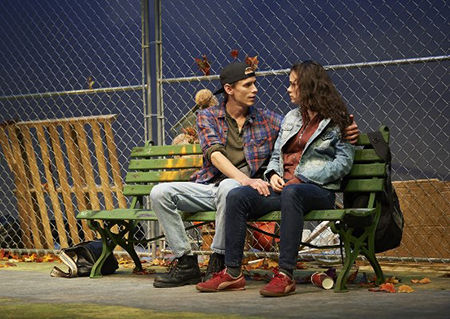
Moss Park explores relationships through poverty, playing at the Theatre Passe Muraille
Moss Park, playing at Passe Muraille, opens with Tina and Bobby meeting in a park to try to plan a life that lifts them out of poverty. This is the second time George F. Walker has visited these characters, but you don’t need to have seen the first play (called Tough!) to understand the situation. Tina and Bobby have a toddler, conceived when they were both teenagers. Bobby has not been very involved with parenting, nor has he been employed for any meaningful length of time in recent years.
The writing is sharp and clever. The audience laughed often, usually at Tina (Haley McGee) reacting dryly to one of Bobby’s (Graeme McComb) excuses, complaints, or far-fetched schemes. The set is very well-dressed: a wealth of interesting garbage, including an oversized teddy bear, is strewn behind a chain link fence with two graffiti-covered park benches in front.
The benches gave Tina areas to physically manifest the push and pull of her feelings for Bobby. When she feels herself loving him and wanting to believe in him, she moves closer; she sits on the same bench as him, on the same level. When she’s acknowledging the unlikeliness of him ever changing, she moves to the other bench, or stands up, or even stands on the bench, showing that she is on higher ground than he is.
The chain link fence provided wonderful opportunities for leaning against, hanging off, or just rattling for emphasis.
This is the kind of show where you really want things to work out for the characters, even though you know they won’t. There is not much hope for Bobby and Tina. But there could be if they could just make a hard decision (in Tina’s case) and learn some responsibility (in Bobby’s case.)
But it left my companion and I feeling like something was lacking. He said it felt “surface level” to him. In the ensuing conversation, I came to realize that I was troubled by the socioeconomic positing of the piece.
The title of the play isn’t “Bobby and Tina”, it’s “Moss Park.” If this was just about two youths who are struggling with their personal issues, that would be one thing. But the title makes it seem like it’s relevant to the broader problem of poverty in Toronto.
I live in Moss Park. Most of the disenfranchised people here could not ameliorate their lives by just making better decisions, taking on some responsibility, pulling themselves up by the proverbial bootstraps. That’s the sort of view that entitles the middle-class to blame the poor for their lot, instead of acknowledging that there is an entire class system in place that keeps people oppressed.
Bobby and Tina were both articulate, well-dressed, clean, white, straight, and not addicted to anything. It’s not that people like that don’t exist. They do, but they also have privileges that most socioeconomically disadvantaged folk don’t have.
There were references to Bobby’s alcoholic father and Tina’s disabled mother, showing how the two were born into unfortunate circumstances. But the possibility for them to get out seemed so reachable, that it was frustrating to me that they couldn’t just get it together, and it was worrisome to me that people might think that this is what poverty is usually like.
I’m probably overthinking it, because I think about social justice issues a lot, and because I do live in the titular neighbourhood. So take those grains of salt with this review. It’s still a fully enjoyable, funny and polished piece of theatre.
Details
- Moss Park plays at Passe Muraille until November 16th
- Shows are Tuesday to Saturday at 7:30 pm, with Saturday Matinees at 2:00 pm
- Tickets are $20.00 to 32.50 wth PWYC Saturday Matinees
- Purchase tickets online or at 416-504-7529
Photo of Graeme McComb and Haley McGee by Michael Cooper
